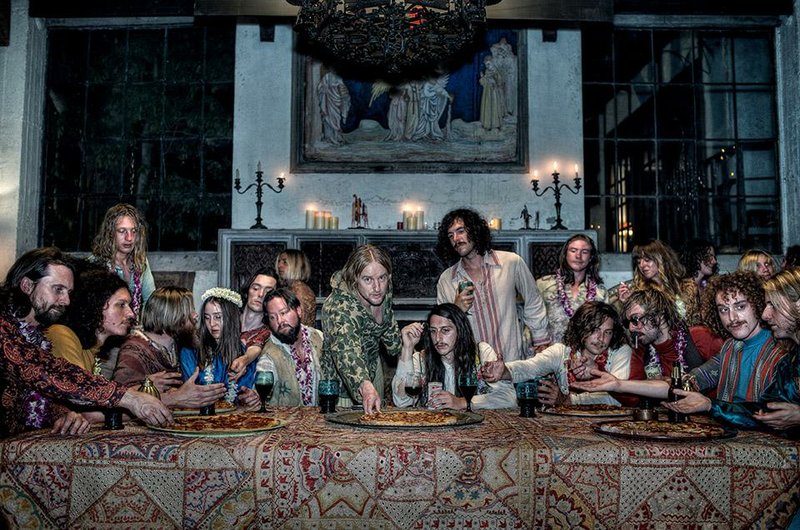"Inherent vice" is a legal term of art that refers to some hidden defect in a physical object that causes it to deteriorate. It's kind of like hamartia -- a classic hero's tragic flaw. It's an insurance company loophole, grounds for denying a claim.
It's fair to guess that Thomas Pynchon titled his 2009 postmodern detective novel Inherent Vice at least partly as a nod to William Gaddis, who used the term a few times in his 1955 novel The Recognitions, a novel that's about, among many other things, art and forgery and the myth of originality. It works because Pynchon's book is more a literary exercise masquerading as a detective novel than a detective novel -- it is Pynchon playing with the tropes of Raymond Chandler and Dashiell Hammett, transposing them to the paranoid badlands of 1970 Southern California, a few months after Charles Manson and his crew creepy-crawled out of the desert and administered a bloody coup de grace to the paisley hippie dream.
Inherent Vice
90 Cast: Joaquin Phoenix, Jena Malone, Josh Brolin, Katherine Waterston, Reese Witherspoon, Benicio Del Toro, Owen Wilson, Eric Roberts, Serena Scott Thomas, Maya Rudolph, Jeannie Berlin, Martin Short, Martin Donovan
Director: Paul Thomas Anderson
Rating: R, for drug use throughout, sexual content, graphic nudity, language and some violence
Running time: 148 minutes
Now Paul Thomas Anderson has made a comedy of Pynchon's novel, and it's remarkably faithful to the author's vision. It's a shaggy wayback machine that is better at evoking that sun-blasted and scary moment better than any film that wasn't actually made at the time. If you want to know what America looked and felt like at the end of the '60s -- right at the taut limit of the tether, before The Man yanked back the chain -- Inherent Vice is your gold ticket.
What plot there is is purposefully convoluted and diffuse; Inherent Vice plays largely through the consciousness of a dope-addled private detective named Larry "Doc" Sportello (Joaquin Phoenix), a competent and relatively honest broker who, at the urging of his ex-girlfriend Shasta (Katherine Waterston), begins to look into the disappearance of Shasta's current lover, a predatory real estate developer named Mickey Wolfmann (Eric Roberts).
Shasta believes Mickey's wife (Serena Scott Thomas) is planning to have him committed so she can make off with his fortune, but hangdog Doc's subsequent pokings around reveal lots of mysterious, nefarious stuff that may or may not be peripheral to Wolfmann's disappearance. Then Shasta disappears, and Doc moseys up on an entity called the Golden Fang, which is a schooner docked at San Pedro (allegedly with a cargo of "inherent vice" it's smuggling from the Caribbean) but also the name of a real estate group dominated by wealthy dentists.
As Doc tries to work out what -- if any -- connections exist among these various film noir conventions, he's being alternately hounded and bailed out by mystical Los Angeles Police Department Detective "Bigfoot" Bjornsen (Josh Brolin), a bully who loathes dirty hippies in general but maybe harbors a soft spot for Doc. (Or maybe he just wants to keep Doc around to take an even bigger fall.)
Now I understand that there is a certain segment of the audience that will absolutely hate Inherent Vice.
They will want the mystery solved, the bad guys identified, justice done or denied -- anything but the hazy, drifting denouement we're granted. This is a dopey movie in the sense that it operates in a buzzy territory where lots of ideas get thrown around but few are examined. There's always another distraction, another grim joke. It's like The Maltese Falcon in that the plot, if anyone could ever manage to untangle the through-line from the snarl of incidental episodes, probably doesn't make much sense.
If the movie has a flaw, it is that it is studded with familiar actors to a distracting extent. Maya Rudolph, for instance, has a tiny role as a receptionist. I was briefly taken out of the movie by wondering if another minor character was played by Elizabeth Moss (she wasn't; she was played by an adult film star named Belladonna).
That quibble aside, I just adore this thing, even though I understand why some people who are smarter and have better taste than I won't. This is a movie for people who can allow themselves to soak in movies, who don't require a scorecard to keep track of the characters. It's a dreamy movie that's all about the textures, the flat valley light glancing off the David Hockney planes. It's a movie that revels in its moviedom even as it replicates, in a very naturalistic way, a particular time and place. There's more than a little of James Ellroy's secret history of Los Angeles, with its extralegal supercops, and Phoenix's mutton-chopped, mumbling performance evokes the brilliant Elliott Gould as Philip Marlowe in Robert Altman's The Long Goodbye (although some will complain he's got nothing to say and they can't understand it anyway).
It's a movie about a knight-errant, a (self-)limited and ultimately powerless guy trying to do his best. It's about the crack in everything. (Which, someone once said, is how the light gets in.)
MovieStyle on 01/09/2015

